| Srl | Item |
| 1 |
ID:
130322
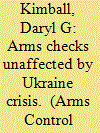

|
|
|
|
|
| Publication |
2014.
|
| Summary/Abstract |
Although the widening confrontation over the political future of the Crimean peninsula and other parts of the former Soviet Union has ruptured already-strained relations between Moscow and the West and put at risk the implementation of some nuclear risk-reduction initiatives and agreements, Russia is not planning to stop allowing the on-site inspections required under the 2010 New Strategic Arms Reduction Treaty (New START), Russian officials said last month. To protest Russia's actions to take control of Crimea, the seven non-Russian members of the Group of Eight (G-8) industrialized countries have suspended Russia's membership in the group. As part of that decision, the seven countries-Canada, Italy, France, Germany, Japan, the United Kingdom, and the United States-changed the location of their planned June summit from Sochi to Brussels. The Russian actions in Crimea have disrupted planning for the activities of the Global Partnership against the Spread of Weapons and Materials of Mass Destruction, which the G-8 launched in 2002.
|
|
|
|
|
|
|
|
|
|
|
|
|
|
|
|
| 2 |
ID:
130356
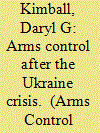

|
|
|
|
|
| Publication |
2014.
|
| Summary/Abstract |
The Global Nuclear Disarmament and risk reduction enterprise is at a crossroads as U.S.-Russian relations have reached perhaps their lowest point in more than a quarter century. Nevertheless, it remains in U.S. and Russian interests to implement existing nuclear risk reduction agreements and pursue practical, low-risk steps to lower tensions. Present circumstances demand new approaches to resolve stubborn challenges to deeper nuclear cuts and the establishment of a new framework to address Euro-Atlantic security issues.
Even before the recent political turmoil in Ukraine and Russian President Vladimir Putin's extralegal occupation and annexation of Crimea, relations between Moscow and Washington were chilly. Despite U.S. adjustments to its missile defense plans in Europe that eliminate any threat to Russian strategic missiles, Putin rebuffed U.S. President Barack Obama's proposal last June to reduce U.S. and Russian strategic stockpiles by one-third below the ceilings set by the New Strategic Arms Reduction Treaty (New START).
Moving forward will be difficult, but doing nothing is not an option. Through earlier crises during and after the Cold War, U.S. and Russian leaders pursued effective arms control and disarmament initiatives that increased mutual security and significantly reduced the nuclear danger. Much has been achieved, albeit too slowly, but there is far more to be done.
As the world's non-nuclear-weapon states persuasively argue, U.S. and Russian stockpiles still far exceed any plausible deterrence requirements, and the use of just a few nuclear weapons by any country would have catastrophic global consequences. As the 2015 Nuclear Nonproliferation Treaty (NPT) Review Conference approaches, pressure to accelerate action on disarmament will only grow.
For now, neither Russia nor the United States wants to scrap the existing arms control regime, including New START and the Intermediate-Range Nuclear Forces (INF) Treaty, which provide greater predictability and stability in an otherwise strained bilateral relationship. A return to a period of unconstrained strategic nuclear competition would not only deepen the distrust and increase dangers for both sides, but also would undermine the NPT. Scrapping the existing nuclear risk reduction measures would do nothing to protect Ukraine from further Russian aggression or reassure nervous NATO allies.
Unfortunately, the profound tensions over Ukraine delay the possibility of any formal, bilateral talks on nuclear arms reductions and missile defense. In light of these realities, Obama and other key leaders must explore alternative options to reduce global nuclear dangers and defuse U.S.-Russian strategic tensions.
|
|
|
|
|
|
|
|
|
|
|
|
|
|
|
|
| 3 |
ID:
098129
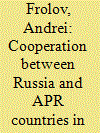

|
|
|
|
|
| Publication |
2010.
|
| Summary/Abstract |
The article surveys international cooperation efforts to dismantle decommissioned submarines of the Russian Pacific Fleet. Russia's difficult financial and economic situation and its inability to dismantle its multi-purpose nuclear submarines forced it to seek assistance from Japan, in which later also joined three other APR countries - Australia, South Korea, and New Zealand. Since cooperative efforts were first launched, foreign funds have been used to dismantle three nuclear submarines, build a radioactive waste processing plant, and a contract has been signed for dismantling two more nuclear submarines.
|
|
|
|
|
|
|
|
|
|
|
|
|
|
|
|
| 4 |
ID:
023513
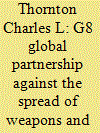

|
|
|
|
|
| Publication |
Fall/winter 2002.
|
| Description |
135-152
|
|
|
|
|
|
|
|
|
|
|
|
|
|
|
|
| 5 |
ID:
068702
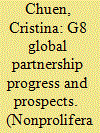

|
|
|
| 6 |
ID:
131350
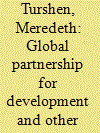

|
|
|
|
|
| Publication |
2014.
|
| Summary/Abstract |
This article revisits the United Nations Millennium Development Goals (mdgs) set in 2000, timely now because policy makers are currently making plans for the period after 2015. After laying out a critical analysis of the mdgs, the article focuses on Millennium Goal 8, the global partnership for development. The argument made is that the absence of any goal to reset the asymmetrical power relations between the North and the South reveals the limitations of the endeavour. The pharmaceutical industry is discussed in detail because mdg8/Target 6 deals with access to affordable, essential drugs in developing countries. This target seems emblematic of a problem found throughout the millennium project: the unaddressed need for real economic development. Target 6 exemplifies both North-South and public-private conflicts of interest, which are carefully hidden in official documents behind the euphemism of 'partnership', as if countries of such unequal power could be partners.
|
|
|
|
|
|
|
|
|
|
|
|
|
|
|
|
| 7 |
ID:
119037
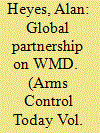

|
|
|
| 8 |
ID:
119027
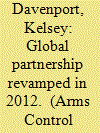

|
|
|
| 9 |
ID:
072783
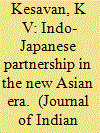

|
|
|
| 10 |
ID:
148335
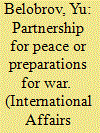

|
|
|
|
|
| Summary/Abstract |
THE JULY 2016 WARSAW NATO Summit not only decided to strengthen its military and political confrontation with Russia but also strongly invigorated the realization of its strategy designed to transform the North Atlantic Alliance from a purely regional defensive pact into a global military-political structure of "cooperative security" accommodating the geopolitical interests of the United States and the leading Western countries and seen as a substitute of the "inefficient" United Nations. One of the key elements of this newly formulated strategy is creating a global coalition of the NATO partners with the biggest possible number of states and international organizations from all corners of the world. The NATO strategists expect that this will bring them closer to their abovementioned aim.
|
|
|
|
|
|
|
|
|
|
|
|
|
|
|
|
| 11 |
ID:
136055
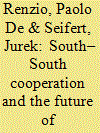

|
|
|
|
|
| Summary/Abstract |
International development cooperation is undergoing fundamental changes. New – or often re-emerging – actors have gained importance during the past two decades, and are increasingly challenging the traditional approach to development cooperation associated with the members of the Development Assistance Committee of the oecd. Their supposedly alternative paradigm, ‘South–South cooperation’ (ssc), has been recognised as an important cooperation modality, but faces contradictions that are not too different from those of its North–South counterpart. ssc providers are highly heterogeneous in terms of policies, institutional arrangements, and engagement with international forums and initiatives. This article contributes to current debates on ssc by mapping the diversity of its actors – based on illustrative case studies from the first and second ‘wave’ of providers – and by presenting and discussing some possible scenarios for the future of ssc within the international aid system.
|
|
|
|
|
|
|
|
|
|
|
|
|
|
|
|
| 12 |
ID:
119292
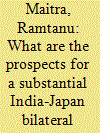

|
|
|